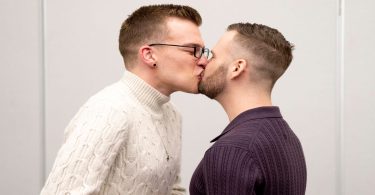Marvel has never exactly been at the forefront of LGBTQ representation. So far, every queer character has been more or less tokenized: a director cameo, a quick kiss, a character with two moms. Technically, the first appearance of a gay Avenger was actually baby Billy Maximoff in WandaVision, and that was only because fans knew he was destined to eventually become Young Avengers member Wiccan.
Agatha All Along changed all of that. Not only did the series confirm Billy was out and proud and very in love with his boyfriend Eddie, it also teased some tension between Agatha Harkness and Rio Vida, the black-hearted Green Witch. It wasn’t until after we learned they are exes that Rio revealed her true form: Death itself. “What can I say?” Agatha quipped. “I like the bad boys.”
But in the final moments of the show, Agatha and Rio finally kissed, only for Agatha to die immediately afterward. At first glance, it looks like another representation misstep by Marvel, but it’s actually a clever subversion and takedown of the queer stories that preceded it.

Marvel Studios
Queer representation is relatively new to media, and because of that, LGBTQ characters often fall victim to antiquated tropes. Queer relationships are often portrayed as secret and shameful, or the homophobic bully character is actually just deeply closeted. But one of the most pervasive queer tropes in media is “Bury Your Gays,” which describes the tendency for queer characters — especially women — to be killed off immediately after finding love.
The most famous example is in Buffy the Vampire Slayer, where Willow and her girlfriend Tara were happy and lovey-dovey together. Tara had even garnered a spot in the opening titles, only for her to be brutally murdered, spawning Willow’s quest for revenge and the birth of “Dark Willow.” Clarke and Lexa from The 100 are another classic example, with Lexa dying soon after starting a relationship with Clarke.
The point of the trope is that you can give the characters a happy ending, but then you have to continue to write a happy queer couple, which isn’t very dramatic. By killing one member off, you can focus instead on tragedy instead of joy.

Marvel Studios
But when Agatha and Rio kiss in Agatha All Along Episode 8, the tragedy isn’t a shock: it’s the entire point. Agatha is effectively giving herself a very literal Kiss of Death, sacrificing herself so Billy can live. Agatha must have known that she was doomed to die when Rio appeared, just as she knew her son was doomed when Rio appeared at his birth. But it’s also not actually a tragedy at all — neither character is gone for good. A gay character is buried, but she’s just as quickly brought back as a ghost.
Agatha is killed off, but she’s not written off — she’s actually one of the few characters from this show who has the possibility of appearing in the MCU again. This isn’t an example of Bury Your Gays, it’s just the opposite: Have Your Gays Seduce the Concept of Death Itself and then Refuse to Enter the Afterlife. Agatha would never do anything normal, and that includes dying.
Agatha All Along is now streaming on Disney+.







